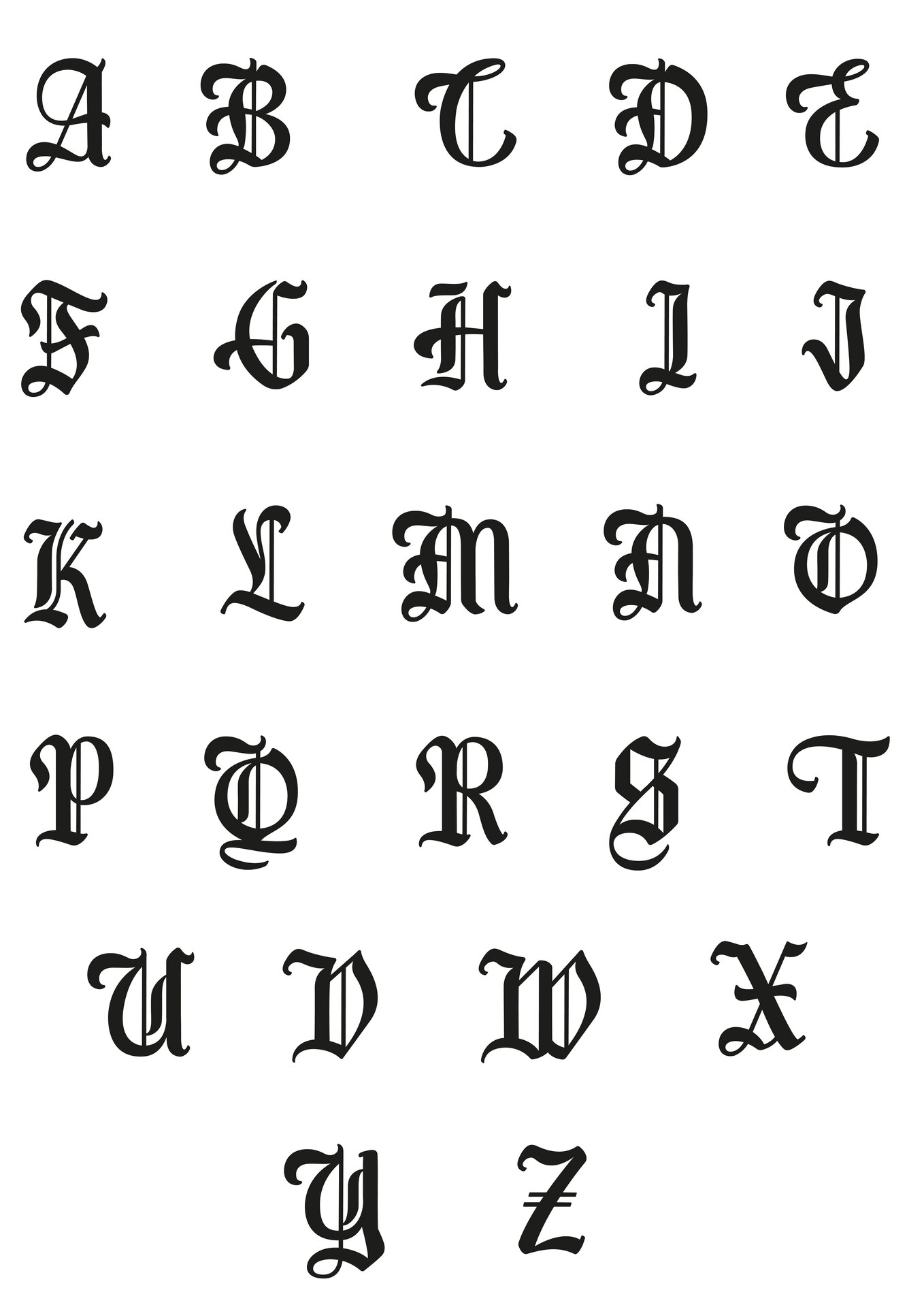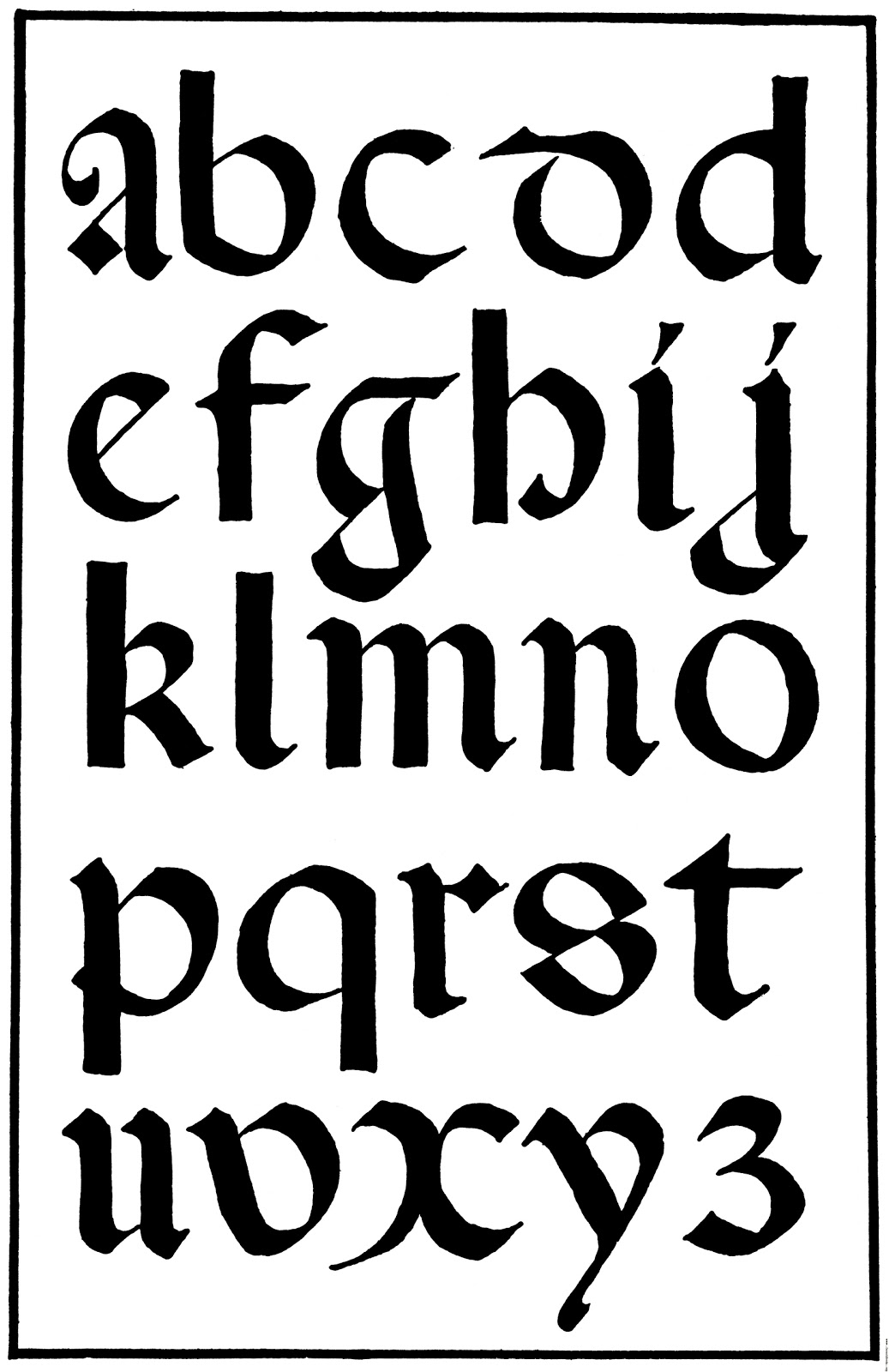Unveiling the Mystery of the Old English Gothic Font Alphabet
Stepping into a dimly lit library, your fingertips tracing the spines of ancient, leather-bound books, you might feel a world away from the digital fonts that dominate our screens. But what if a font could transport you back to those medieval scriptoriums, evoking the grandeur of Gothic cathedrals and the mystique of illuminated manuscripts? Enter the Old English Gothic font alphabet, often mistaken as synonymous with "Old English" itself. This striking typeface, with its sharp angles and dramatic flourishes, holds a unique power to transport us through time and infuse designs with a sense of history, power, and intrigue.
Despite its name, the Old English Gothic font alphabet, also known as Blackletter, doesn't share a direct lineage with the language of Beowulf. This font family, emerging in the 12th century, is more accurately a child of the High Middle Ages. Originating in Europe, it rose to prominence during the Gothic period, hence its common association. Picture monks meticulously copying biblical texts, their quills etching the distinctive thick-and-thin strokes onto parchment—this was the world where the Old English Gothic font found its footing.
The font's rise was intrinsically linked with the printing revolution. Johannes Gutenberg, the father of the printing press, famously used a Blackletter typeface for his groundbreaking Gutenberg Bible. This event cemented the font's place in history, associating it with knowledge, authority, and the burgeoning spread of ideas. Over the centuries, its use evolved, appearing in official documents, royal proclamations, and even on early university certificates.
However, the reign of the Old English Gothic font wasn't without its challengers. The rise of humanist scripts during the Renaissance, with their emphasis on clarity and readability, slowly chipped away at the Blackletter's dominance. These newer fonts, like Roman and Italic, eventually overshadowed their Gothic predecessors, becoming the standard for printed texts in much of Europe. Yet, the Old English Gothic font refused to disappear entirely. It clung to its niche uses, often appearing in religious texts, official documents, and even newspaper mastheads, becoming a symbol of tradition, heritage, and a link to the past.
Today, this evocative typeface experiences a resurgence. Graphic designers, drawn to its timeless appeal, weave it into logos, posters, and even tattoos. Heavy metal bands embrace its dramatic flair, while craft brewers use it to evoke an old-world charm. This enduring popularity speaks to the unique ability of the Old English Gothic font to bridge the gap between eras, lending an air of historical weight and visual intrigue to any project it graces.
While often associated with "Old English," it's important to remember that the language and the font are distinct entities. "Old English" refers to the language spoken in Anglo-Saxon England, while the "Old English Gothic font" refers to a specific style of typeface. This distinction is crucial to avoid historical inaccuracies.
Advantages and Disadvantages of Using Old English Gothic Font
| Advantages | Disadvantages |
|---|---|
| Evokes a sense of history, tradition, and authority. | Can be difficult to read in large quantities. |
| Visually striking and attention-grabbing. | Not suitable for all types of content or audiences. |
| Adds a touch of elegance and sophistication. | Can appear overly formal or antiquated in some contexts. |
Despite its enduring allure, the Old English Gothic font isn't a one-size-fits-all solution. Its ornate nature demands careful consideration, ensuring readability and appropriateness for the intended message. Just as a master craftsman selects the right tool for the job, designers must wield this powerful typeface with discernment, respecting its historical weight while harnessing its visual impact.
In a world saturated with clean, modern fonts, the Old English Gothic alphabet stands apart. It's a whisper from the past, a visual echo of an era where craftsmanship reigned supreme. While it may not be the right choice for every project, when used strategically, it has the power to elevate a design from ordinary to unforgettable, leaving a lasting impression on anyone who encounters its captivating charm.

Old english gothic font 1968 solid black tattoo idea on thigh in 2023 | YonathAn-Avis Hai

8 Gothic Letters Font Images | YonathAn-Avis Hai

old english gothic font alphabet | YonathAn-Avis Hai

8 Gothic Letters Font Images Gothic Graffiti Alphabet Letters A Z | YonathAn-Avis Hai

Blackletter modern gothic font. | YonathAn-Avis Hai

Royal Alphabet Free Stock Photo | YonathAn-Avis Hai

orez beton Demonteaza gothic font generator grămadă tăcere A doua zi | YonathAn-Avis Hai

Printable Old English Letters | YonathAn-Avis Hai

Old English Font Letter Z | YonathAn-Avis Hai

Old English Gothic Windows font | YonathAn-Avis Hai

"Goth Pride" in this font. | YonathAn-Avis Hai

old english gothic font alphabet | YonathAn-Avis Hai

Watch learn general about lessons both pecuniary customer | YonathAn-Avis Hai

Calligraphy Writing A To Z | YonathAn-Avis Hai

9 Vintage Lettering Fonts Capital Letters Images | YonathAn-Avis Hai